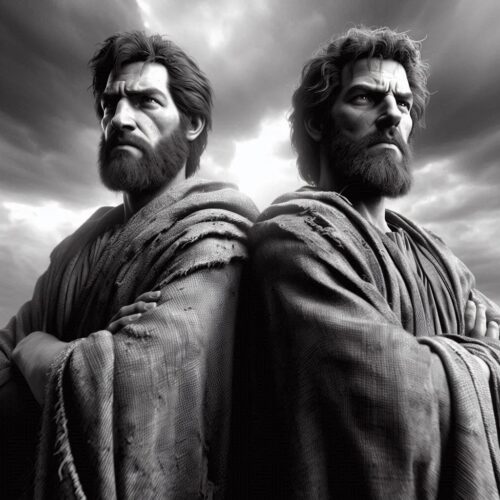Romans 9:13: Why Does God Say He ‘Hated’ Esau?
God’s declaration in Romans 9 is striking, and at first read, perhaps even harsh, “Jacob I loved, but Esau I hated”. Coming from God, the statement has challenged readers for centuries and raises important questions about His character, divine choice, and the nature of salvation.
Let’s carefully examine what this declaration means and why it’s crucial for our understanding of God’s ways.
Why Does God Say He Hated Esau?—The Historical Context
To grasp the statement’s full meaning, we must first look at its original context in Malachi 1:2-3, where God addresses the nation of Israel. The declaration isn’t merely about two individuals but primarily concerns two nations: Israel (descended from Jacob) and Edom (descended from Esau). The two nations had a complex history spanning centuries, with Edom often standing in opposition to Israel and God’s purposes.
The historical relationship between these nations provides crucial context. Edom consistently opposed Israel, refused passage during the Exodus, and often allied with Israel’s enemies. This national dimension helps us understand that God’s “hatred” of Esau extends beyond personal animosity to a divine purpose worked out through historical events.
Making Sense of God’s “Hatred”
“Hatred” in this context requires careful interpretation. In biblical language, particularly in the Hebrew idiom, the love-hate contrast often expresses preference or choice, rather than emotional animosity. This linguistic pattern is seen elsewhere in Scripture, such as when Jesus says we’re to “hate” father and mother to be His disciple (Luke 14:26)—so clearly, it’s a statement about ultimate allegiance, rather than emotional hostility.
It’s crucial to understand divine hatred, then, as preferential rejection, if we’re to avoid mischaracterising God’s nature. It’s a judicial and sovereign decision, rather than a malicious or spiteful emotion. The language emphasises God’s sovereign choice in executing His purposes through history.
God’s Sovereign Choice
Perhaps the most striking aspect of this declaration is its timing. God’s choice was made “before the twins were born, before they had done anything good or bad” (Romans 9:11). This timing explicitly removes human merit from the equation. Neither Jacob’s deceptiveness nor Esau’s profanity caused God’s choice—His decision preceded their actions.
This truth emphasises God’s absolute freedom in showing mercy. The passage demonstrates God’s choices aren’t based on human achievement or moral superiority but on His own sovereign will and purpose. This can be a difficult truth to accept, as it challenges our natural understanding of fairness and justice.
Common Misunderstandings
Several misunderstandings must be addressed.
- This passage doesn’t suggest God is capricious or unjust. Rather, it reveals His choices serve purposes beyond our immediate comprehension.
- God’s “hatred” of Esau doesn’t mean He treated him unjustly—Scripture shows Esau lived a prosperous life and received many temporal blessings.
- This text isn’t promoting fatalism, or suggesting human choices don’t matter. Instead, it establishes the priority of divine initiative in salvation and history.
Theological Implications
God’s declaration in Romans 9:13 reveals profound truths about divine election. It shows us God’s purposes in salvation history operate according to His sovereign choice rather than on human merit or effort. It demonstrates both God’s complete freedom in showing mercy and His wisdom in accomplishing His purposes.
The passage also highlights the relationship between divine sovereignty and human responsibility. While emphasising God’s sovereign choice, it doesn’t negate human accountability. Rather, it places human choices within the broader context of God’s overarching purposes.
Perhaps most importantly, the text reveals the glory of divine wisdom. God’s choice of Jacob over Esau serves as a pattern for understanding how He works throughout history—often choosing the unlikely and undeserving to accomplish His purposes and display His grace.
Conclusion: Why Does God Say He Hated Esau?
The statement “Jacob I loved, but Esau I hated” reveals deep truths about God’s sovereign purposes in salvation history. While it may seem challenging to our natural understanding, it points us toward a greater appreciation of divine wisdom and sovereignty. The declaration doesn’t reveal a capricious deity but rather, a God who works according to His own perfect purposes, ultimately displayed most clearly in the person and work of Christ.
Understanding this text properly leads us not to despair but to wonder at the depths of God’s wisdom and the perfection of His purposes. It calls us to humble submission before divine sovereignty while trusting in the perfect righteousness of all God’s ways.
Why Does God Say He Hated Esau?—Related FAQs
If God hated Esau before he was born, how can God be fair? The question itself reveals our human tendency to judge God by our standards of fairness. God, as Creator, has the right to do with His creation as He pleases, just as a potter has rights over the clay (Romans 9:21). His choices are always righteous and serve His perfect purposes, even when we don’t understand them.
- Does this mean Esau couldn’t have been saved even if he wanted to? Scripture never suggests that Esau sought spiritual salvation and was denied it. The issue isn’t that Esau couldn’t come to God, but that in his natural state, like all humans, he didn’t want to come. God’s “hatred” (non-election) left Esau in his natural state, while His love transformed Jacob’s heart.
- How does this relate to God’s love for the world in John 3:16? God’s special electing love for some (like Jacob) doesn’t negate His general benevolence toward all creation. God shows common grace to all people, including Esau who prospered materially. However, God’s saving love is particular and specific, demonstrated in His sovereign choice of some for salvation.
If God chose Jacob despite knowing his deceptive character, what does this tell us about election? This powerfully demonstrates God’s choice isn’t based on foreseen merit or moral superiority. Jacob’s deceptive actions show God often chooses deeply flawed people to display His transforming grace. This highlights salvation is entirely of grace, not human worthiness.
- Does God’s hatred of Esau mean Christians should hate certain people too? Absolutely not. God’s “hatred” refers to His sovereign choice in election, not personal animosity. Christians are explicitly commanded to love their enemies, pray for those who persecute them, and show Christ’s love to all people. We leave final judgment to God while showing mercy to all.
- Why would God reveal this difficult doctrine in Scripture? This doctrine humbles human pride by showing us salvation depends entirely on God’s mercy—not human effort or choice. It also provides deep comfort to believers, assuring them that their salvation rests on God’s unchangeable purpose rather than their own faithfulness. These truths produce both humility and security.
What’s the relationship between God’s choice of Israel and individuals like Jacob? God’s choice of Jacob over Esau serves as a pattern for both national and individual election. Just as God chose Israel not because of their size or righteousness (Deuteronomy 7:7-8), He chooses individuals for salvation not based on their works or merit but according to His sovereign purpose. The national election of Israel illustrates principles of individual salvation.
Why Does God Say He Hated Esau?—Our Related Posts
Editor's Pick

Satan’s Lie: ‘God Hasn’t Given Us Evidence to Believe’
*Editor's Note: This post is part of our series, 'Satan’s Lies: Common Deceptions in the Church Today’… “For since the [...]

When God Gives Us A New Heart: How Grace Rewires Our Desires
A REFORMED GUIDE TO SPIRITUAL TRANSFORMATION A Mystery: How Our Heart Changes Over Time It’s nothing less than a profound [...]

The Lost Empire of the Hittites: How Archaeology Proved the Bible Right
Standing in the scorching Turkish sun in 1906, archaeologist Hugo Winckler could hardly believe his eyes. Before him lay the [...]

The Priesthood of All Believers: What the Bible Really Teaches
The concept of the priesthood of all believers is one of the most revolutionary doctrines to emerge from the Protestant [...]

Are Children Punished For Parents’ Sins? What Does Scripture Really Say?
The question haunts many believers: "Will I be punished for what my ancestors did?" Perhaps we’ve heard stories of "generational [...]

Patterns In Chaos: How Fractals Scream Intelligent Design
In the beginning, God created the heavens and the earth, bringing order from chaos. Today, mathematical patterns known as fractals [...]

Nature’s Ultimate Computer: The Human Brain Defies Evolution
The human brain contains roughly 100 billion neurons forming 100 trillion synaptic connections—a level of complexity that surpasses our most [...]

More than Conquerors: Gospel Victory in Fighting Temptation
THE FALL, THE CONSEQUENCES, THE DELIVERANCE The story of temptation is as old as humanity itself. In the perfect garden [...]

Why Didn’t Jesus Come Before Noah’s Flood? God’s Perfect Timing…
Why Didn’t Jesus Come Before Noah’s Flood? Salvation-wise, How Does It Matter? When considering the timing of Christ’s incarnation, we [...]

What Roles Do Angels Play In God’s Providence? What The Bible Teaches
What roles do angels play in God's providence? When we think of angels, our minds often drift to romanticised images [...]
SUPPORT US:
Feel the Holy Spirit's gentle nudge to partner with us?
Donate Online:
Account Name: TRUTHS TO DIE FOR FOUNDATION
Account Number: 10243565459
Bank IFSC: IDFB0043391
Bank Name: IDFC FIRST BANK






